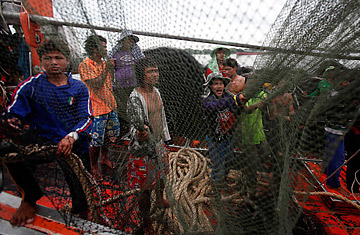
Migrant workers from Burma work on a fishing boat at the port of Mahachai, near Bangkok September 24, 2011.
Khun Mint spins in circles on his small motorcycle, joyfully kicking up gravel on a rural road just south of Bangkok, Thailand. It's hard to express the excitement he feels to have two feet squarely on land.
That's because the 23 year-old Burmese migrant laborer spent the last year working on a Thai fishing boat. It was the worst year of his life he says, one that comes racing back whenever he hears a horn, the sound that rang in his every day at sea. "Whenever I hear a car honk, I feel like I was going back from freedom back to the prison. I started seeing all the bad things, all the fish, all the torture all over again in my mind."
Based on Thai government statistics, there are an estimated 2 to 3 million Burmese working in Thailand. Many of the original wave of migrants came during political turmoil in the late 1980s, but the vast majority arrived in the last decade, for economic reasons. Corruption, international sanctions, and government mismanagement have strangled the Burmese economy. Most importantly, to young Burmese like Khun Mint, the country ranks near the bottom 10% in terms of per capita GDP. So people leave, by the thousands, often with the help of what some migrant labor rights advocates worry is a growing human trafficking network.
What most Burmese migrants find in Thailand is not the fortune they imagined. Around half wind up in garment factories near the border, where they work 80 hour weeks, but often make only around $2 a day. Others find slightly higher paying work on farms, and at constructions sites. The best paying but worst-case scenario for Burmese women is prostitution. The equivalent in both respects for the men is commercial fishing boats, where they can make as much as $200 a month, but face brutal work conditions.
Khun Mint says two years ago he had made up his mind to head to Thailand, but he needed help. When he reached Mayawatti, the Northeastern town that borders Mae Sot, Thailand, he met what many refer to as a "broker" or "recruiter" at a barbershop. The man helped him cross the river into Thailand, for a fee to be paid later, and from there, he eventually was led to a fishing village in the South. After a week spent locked up in a safe house run by a Thai woman, Khun Mint was sold by a trafficker to a ship's captain, for 22,000 Thai Baht, around $800. That money recuperated the broker's cost for transporting Khun Mint, and then some.
The young Burmese man essentially worked as slave labor the first six months, paying off his debt. Conditions were horrible, he says, thanks in part to enforcers on the boat, who carried what Khun Mint refers to as the, "stingray." "When you're casting the net or pulling it back up, if he see something he doesn't like, or even randomly, he'll start whipping you. It's like that."
